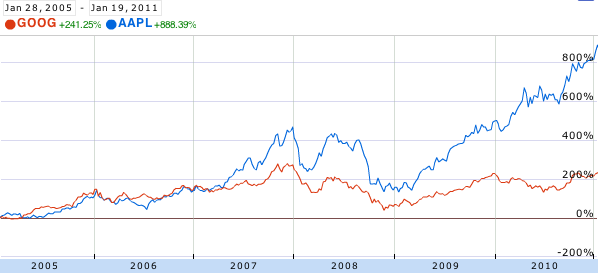Charles Arthur provides a convincing back-story to the Google exec re-shuffle.
Google shuffle: why Eric Schmidt had to be pushed from the top | Technology | guardian.co.uk.
There is evidence of execution failure and indecision or muddled messages to stakeholders. Shared leadership arrangements never end well.
But in this forum I’ve been critical of their strategy. Though I’ll be the first to admit that such criticism is not founded on data but on intuition, strategy is always made in a vacuum of data. It is just an unfortunate fact of life that we don’t have data about the future.
But what data we do have is about the past and it shows the contrast between Apple and Google.
As a sample, let’s look at the performance in the last quarter:
[nohang]
| Growth | Apple | |
| Revenue | 26% | 70% |
| Earnings | 29% | 75% |
| P/E | 24.13 | 18.57 |
[/nohang]
Apple grew about 2.5x faster. The companies are in very different businesses, but the money they make is the same color. The investors have been paying attention:
Source: Google Finance.
In 2005 and 2006, Apple and Google were neck-and-neck in terms of returns to shareholders. However, with the iPhone’s arrival in 2007 the stocks diverged. Google gained 38% since January 2007 while Apple gained 300%.
However, going forward, the market is kinder to Google than to Apple, punishing Apple’s 75% growth with a P/E of 18 (ex-cash 15) and rewarding Google’s 29% growth with a P/E of 24 (22.5 ex-cash) . Although Google’s P/E is proportionate relative to its growth, Apple’s P/E implies deep pessimism.
But does Google’s performance suggest management failure? Certainly not. It’s been a great performance. Google is arguably at the top of its game. Market share of search has never been better.
Cracks in strategy are hard to spot. One hint is that most of Google’s R&D efforts are defensive. Building browsers and mobile operating systems are methods to ensure they have distribution of search to as many screens as possible. These are expensive means to ensure channels are available for distribution. Expensive not only in terms of engineering costs but also in terms of relationships and opportunity costs.
But even a defensive posture is not sufficient for management change. What I think is the most serious failure is that for the past five years Google has not addressed the possibility of search itself becoming commoditized. Social media and app economies are asymmetric to search. They make money in different ways and appear to be less efficient or effective means to reach users, but they are growing. Facebook has overtaken Google in terms of page views and apps are a new interaction model for cloud-based content that does away with the indexing model Google champions.
The real condemnation of the leadership at Google is that there has been a failure to create entirely new disruptions. As the stock chart above confirms, Android and Chrome are, if successful, sustaining technologies for Google. That’s not going to be enough.
Discover more from Asymco
Subscribe to get the latest posts sent to your email.

